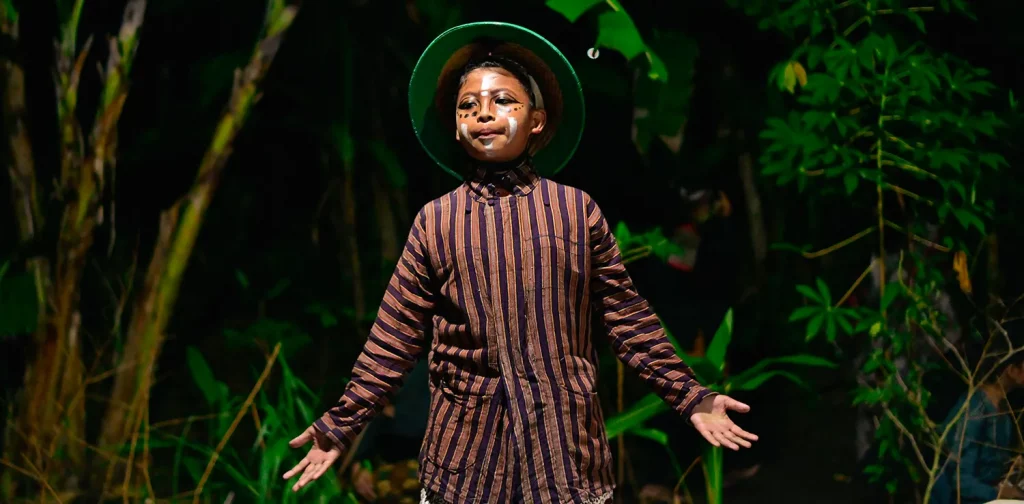Food Sovereignty Children’s Theater by Sekolah Pagesangan

Photo: Children's theater at Wintaos Village Gunungkidul, Indonesia
Last July, I watched children’s theatre stage performance about food sovereignty by Sekolah Pagesangan. That night, local tubers transformed into singing children humming on stage. Together with the farmers, they talked about the food cycle in their village, Wintaos. Glory always accompanied them before Ratu Raras Beben and Buto Trigu came. They enticed the people of Wintaos with rice and flour, crops that used a lot of water. Until finally, drought hit the village and the farmers could not plant rice anymore. So, the people of Wintaos prayed to Biyung Umbi and began to plant the more resilient tubers.
That’s the summary of the stage. It was a beautiful performance that made my heart tremble and amazed by the story and how these children masterfully recited their scripts. It brought the lesson that local food diversity is important. If we depend on rice and wheat, then we will be vulnerable to a food crisis.
Sekolah Pagesangan Children’s Theater
Sekolah Pagesangan (=Pagesangan School) is an informal school and community in Wintaos Village, Gunungkidul Regency, Yogyakarta Province, Indonesia. This school is a place of learning within the context of the locals’ needs about life in rural areas. Here, children are taught life skills as villagers, farming, and the history of their village. The intention is so when the children grow up, they will not forget their roots, where their lives come from.
The children’s theater is a way of learning utilized by Diah Widuretno, the principal of Sekolah Pagesangan. Theater can be an attractive medium for both the local children of Wintaos and the wider community.
Food Sovereignty Theater
When practising for the food sovereignty theater, the children worked hard on their skills and imagination. Besides the children, the performance was a result of hard work and creativity from many people: Heni, Lifia, Diah, Ivy Londa, Nuril, Jati, and others.
Of course, theater practice with children had its own challenges, but it was worth it in the end. The children and the wider community gained knowledge about food sovereignty, food occupation, and food security disasters in the event of a drought, in a light way through this stage.
The response from the audience was very positive. That night, there were three audience groups watching. The women from Wintaos Village were mothers of the stage performers, and were very proud of their children. There were also volunteers from the regular Urip nDeso participants and participants from the Urip nDeso series for children. Urip nDeso is Sekolah Pagesangan’s regular program for teaching about farming and agriculture.
Food Security, Education, and Art
The food sovereignty children’s theater by Sekolah Pagesangan could teach us many things. It taught us about a more resilient food system with local wisdom that suited Indonesian conditions more so we could prevent food crises from happening here. Furthermore, we also learn about the persistence of Wintaos people in celebrating their culture and developing their young generations.
The unique idea of theater as a form of food security education also deserves appreciation. Hopefully, more and more people will open their eyes to food security issues and use art as a medium of sustainability education to a wide audience.
Editor: Nazalea Kusuma

Co-create positive impact for people and the planet.
Amidst today’s increasingly complex global challenges, equipping yourself, team, and communities with interdisciplinary and cross-sectoral insights on sustainability-related issues and sustainable development is no longer optional — it is a strategic necessity to stay ahead and stay relevant.


 Impacts of E-waste Pollution on Animals and Human Health
Impacts of E-waste Pollution on Animals and Human Health  Africa’s Solar Energy Surge: Why 2025 Was a Breakthrough Year
Africa’s Solar Energy Surge: Why 2025 Was a Breakthrough Year  Agrihoods: Integrating Farms and Urban Neighborhoods into Sustainable Communities
Agrihoods: Integrating Farms and Urban Neighborhoods into Sustainable Communities  Women in Waste Management: Asia’s Circularity Runs on Women. Its Policies Still Don’t
Women in Waste Management: Asia’s Circularity Runs on Women. Its Policies Still Don’t  Embracing the Business Value of Sustainability
Embracing the Business Value of Sustainability  American Farmers Call for Government Support Amidst PFAS Contamination
American Farmers Call for Government Support Amidst PFAS Contamination